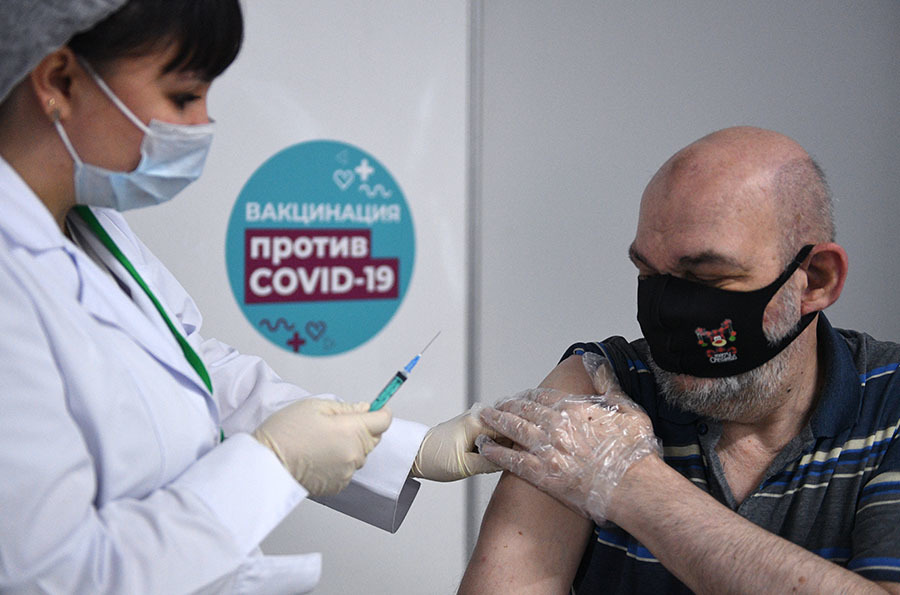Over the past day, 8,885 new cases of coronavirus have been recorded in Russia.
In the previous two days, this figure was 9167 and 9221, respectively.
Since the beginning of the pandemic, 4,510,744 cases of COVID-19 have been identified in all 85 regions of the Russian Federation.
During this time, 4,130,498 people recovered, including 10,337 in the last 24 hours.
97,404 people died from complications that developed against the background of coronavirus infection and concomitant diseases.
During the day, the number of deaths increased by 387.
Most of all new cases of COVID-19 over the past 24 hours were recorded in Moscow - 1551. In St. Petersburg - 749, in the Moscow region - 586.
According to Rospotrebnadzor, for the entire period, more than 119.1 million laboratory tests were carried out on SARS-CoV-2, including 341 thousand in the last day.
482,428 people remain under medical supervision.
Recall that mass vaccination against coronavirus started in Russia in mid-January.
To date, three drugs have been registered in the country: "Sputnik V" developed by the National Research Center for Epidemiology and Microbiology named after Honorary Academician N.F.
Gamalei, "EpiVacCorona", created by the State Scientific Center for Virology and Biotechnology "Vector" and "KoviVak" developed by the Federal Scientific Center for Research and Development of Immunobiological Preparations named after M.P.
Chumakov RAS.
According to the latest data, there are a total of more than 6,000 vaccination points in the country.
The head of the department of zoonotic infections and influenza at the Vector center, Alexander Ryzhikov, told RT about the benefits of the EpiVacCorona vaccine.
According to him, one of the key features of the drug is resistance to mutations in the strain, which was incorporated during the development of the vaccine.
“We selected conservative regions from the composition of viral proteins.
Not immunodominant, but conservative ... Immunodominant epitopes provoke the virus to mutate.
Mutations appear, these mutations we have already identified ... And so far we are tracking all mutations that are known, "Ryzhikov explained.
He noted that all common mutations, in particular the so-called British, South African and Brazilian strains, do not correspond to those conservative sites that were selected during the development of EpiVacCorona.
"This is the advantage of the vaccine, which makes it resistant to mutations," - said the scientist.
He also mentioned among the advantages of the drug the possibility of repeated use during vaccination.
According to him, "one person can be revaccinated for a lifetime."
Among other things, he spoke about the safety of the drug.
“The synthetic nature, the absence of components of animal origin ensure its harmlessness,” he said.
RIA News
© Valery Melnikov
The chief freelance specialist in infectious diseases of the Russian Ministry of Health, Professor Vladimir Chulanov, expressed the opinion that the choice of the drug does not matter.
"From my point of view, the main thing is to get grafted," Chulanov said on the air of Vesti FM.
He noted that at the moment the Sputnik V and EpiVacCorona vaccines are allowed for all ages from 18 years old.
Chulanov added that a decrease in the incidence of coronavirus is being recorded in Russia, but the numbers are still high.
“We are now seeing a slight decrease in the incidence rate, which is certainly very good, but we must not forget: the numbers are still high and it’s too early to relax,” he concluded.
A similar assessment of the situation with morbidity in the Russian Federation is shared by the deputy director for scientific work of the Central Research Institute of Epidemiology of Rospotrebnadzor, Corresponding Member of the Russian Academy of Sciences Alexander Gorelov.
“At present, we can say that we are going through a phase of stabilization of the epidemiological situation with a downward trend,” Gorelova quotes TASS.
According to him, daily fluctuations in the incidence of COVID-19 are still possible in early spring, as the coronavirus acquires the features of a seasonal infection.
"Continued compliance with precautionary measures, as well as vaccination against coronavirus infection, will help to minimize the possible rise in the incidence," the expert noted.
Gorelov also spoke about the measures in force in Russia in relation to those arriving from abroad.
According to him, the current solutions in this area are enough to significantly reduce the risks of imported cases of COVID-19.
He recalled that Russians returning from abroad must pass a PCR test for coronavirus within three days.
Prior to receiving the results of the study, quarantine must be observed.
Citizens of other states are allowed to fly to Russia with an already negative test for coronavirus infection.

